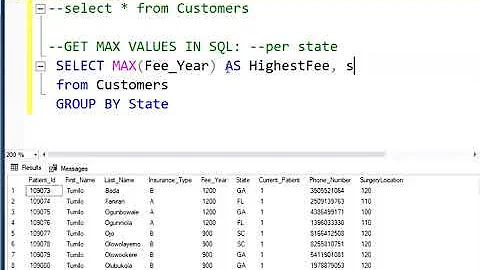Select columns by choosing maximum value in multiple columns in SQL
Solution 1
You can use a subquery to get the max(time) for each name and then join that back to your table to get the final result:
select t1.time,
t1.name,
t1.value1,
t1.value2
from yourtable t1
inner join
(
select max(time) MaxTime, name
from yourtable
group by name
) t2
on t1.time = t2.maxtime
and t1.name = t2.name
Depending on the database that you are using, if you can apply a windowing function like row_number() or rank(), then your query would be similar to the following:
select time, name, value1, value2
from
(
select time, name, value1, value2,
rank() over(partition by name order by time desc) rn
from yourtable
) src
where rn = 1
See SQL Fiddle with Demo of both queries
Solution 2
With distinct on it is quite simple. SQL Fiddle
select distinct on (name)
"time", name, value1, value2
from t
order by t.name, t."time" desc
Related videos on Youtube
Vladimir S.
Updated on July 10, 2022Comments
-
Vladimir S. almost 2 years
Imagine the following exemplary table:
time name value1 value2 12:00 Hans 2 4 12:30 Hans 2 4 13:00 Hans 3 5 14:00 Peter 4 4 15:00 Peter 4 4I want to filter by maximum time stamp and name.
Meaning I want to get
13:00 Hans 3 5 15:00 Peter 4 4Using
select max(time),name,value1,value2 from table group by namedoes not work. It tells me to use an aggregate function or group by on value1 and value2 also.If I group by name, value1 and value2 then I get the following result though since value1 and value2 are different for two rows of Hans:
12:30 Hans 2 4 13:00 Hans 3 5 15:00 Peter 4 4What is the solution?
-
 Taryn about 11 yearsPlease specify the RDBMS that you are targeting by adding the appropriate tag (Oracle, SQL Server, MySQL, etc.). There may be answers that take advantage of language or product features that are not universally supported. Also, by tagging it with a specific RDBMS, your question may receive attention from people better suited to answer it.
Taryn about 11 yearsPlease specify the RDBMS that you are targeting by adding the appropriate tag (Oracle, SQL Server, MySQL, etc.). There may be answers that take advantage of language or product features that are not universally supported. Also, by tagging it with a specific RDBMS, your question may receive attention from people better suited to answer it.
-
-
Vladimir S. about 11 yearsWorks totally great. Thank you!






